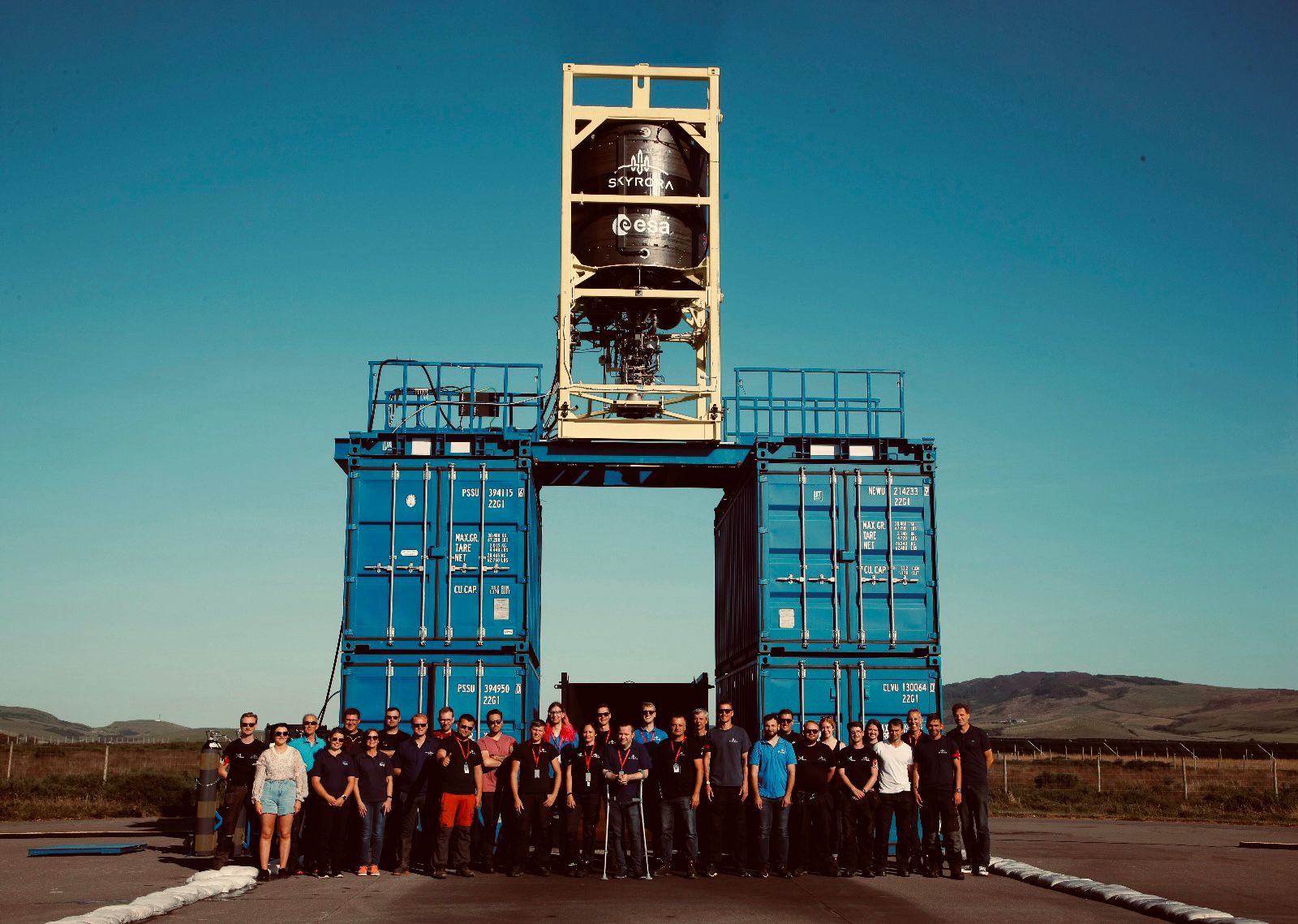U.K.-based launch company Skyrora hit a new milestone in the development of its Skyrora XL rocket with the completion of a static fire test of the second stage. The single engine, designed and manufactured by Skyrora, completed a nominal 20-second burn, bringing the company one step closer to its first orbital launch in late 2023.
Skyrora is one of a number of small launch companies based in the United Kingdom and Europe, each hoping to compete in these countries’ burgeoning commercial space sectors. According to Skyrora COO Lee Rosen, whose career spans a 23-year tenure with the U.S. Air Force and an 11-year stint at SpaceX, this test sets Skyrora apart from its competitors.
“Others like to make a nice showing of their factory or maybe an engine test or things like that, but I think the fact that [we’ve] got an integrated system solution test says a lot about where we are,” he said.
Skyrora XL is a three-stage rocket, with 9 engines powering the first stage and a single engine on the second stage. A smaller engine powers the third stage. It will be capable of sending around 315 kilograms to sun-synchronous and polar orbits about 500-1,000 kilometers above the planet, placing it right alongside Rocket Lab’s Electron in terms of payload capacity. Skyrora is designing the vehicle to be reusable, while Rocket Lab never intended that for Electron but has since pivoted to reuse booster stages.
The company is taking an incremental approach to testing its technology; alongside the Skyrora XL, the company is also gearing up to conduct testing of a single-stage suborbital launch vehicle called Skylark L from Iceland. Skyrora is able to test the avionics system, operations procedures and propellants using this smaller vehicle as it prepares for the first launch of the larger rocket sometime in late 2023. This static fire test takes the XL from a technology readiness level (a measure to judge the maturity of tech) of six to eight, Rosen estimated.

Demonstrating technical capability, Rosen said, was the company’s primary objective. “You don’t even get a seat at the table with the adults unless you get to orbit,” he said.
Even if Skyrora conducts a successful orbital launch — which would be no small achievement — Rosen said the company is looking for ways to differentiate itself from its competitors. To do so, Skyrora is working on building out the functionality of its third stage, so that it not only delivers a satellite to its final orbit, but could also be used for other missions, like refueling and servicing satellites already on orbit or space debris removal. The company is also developing an “eco-friendly” fuel called Ecosene, made from kerosene derived from non-recyclable plastics, which could entice governments looking for greener technologies in the future.
Rosen said the company has received support from the U.K. Space Agency, the European Space Agency (ESA) and regulators like the U.K. Civil Aviation Authority. But that support will only take the commercial launch industry so far.
“If you read the U.K. Space Strategy, the ultimate goal is to be 10% of the world’s space market by 2030,” he said. “But in order to do that, not only do they have to provide moral support, they also have to provide some funding support as well.”
Indeed, substantive government contracts have played a part in the success of nearly every major rocket company operating today. That’s certainly true of SpaceX, which received hundreds of millions in support from NASA as it developed Falcon 9. Other companies like Rocket Lab have been able to garner contracts from government and defense customers, like the U.S. National Reconnaissance Office. Skyrora has received some funding so far — notably a €3 million ($3 million) contract from the ESA’s Boost! program for the qualification of its rocket engine. But moving forward, Rosen said the company is looking forward to more opportunities to compete for launch and other missions.
The static fire test of the second stage took place at Machrihanish Airbase in Scotland (the biggest integrated stage test to take place in the U.K. since he 1970s, Skyrora says). The testing infrastructure was set up and the static fire was conducted in under 72 hours, part of the company’s model to test and launch quickly from anywhere in the world. Before the first orbital launch, Skyrora is looking to test the first stage in the middle of next year.
“It’s not about bragging about what you might go do,” Rosen added. “It’s about doing. That second-stage test is a great way of doing and showing.”































Comment